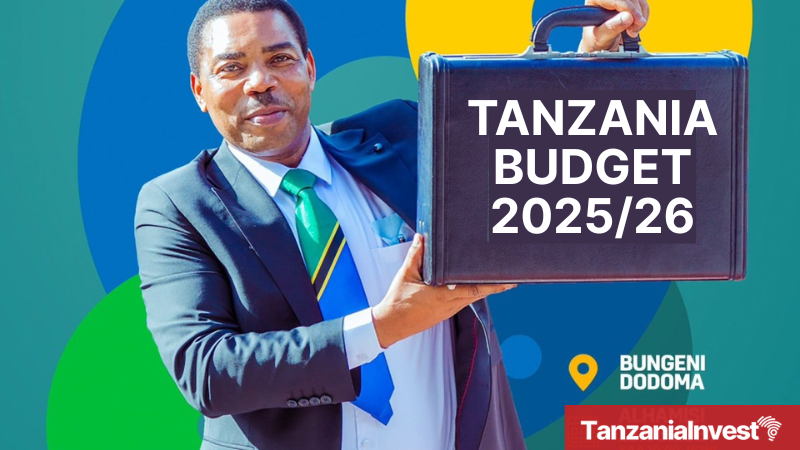On 12 June 2025, Tanzania’s Minister of Finance Dr. Mwigulu Nchemba presented the TZS 56.49 trillion Draft Budget for 2025/26 to Parliament, focusing on domestic revenue mobilization, investment, and inclusive economic transformation.
The budget, which aligns with the final year of the Third Five-Year National Development Plan (2021/22–2025/26) and Vision 2025, is anchored on the theme agreed upon by EAC member states: “Inclusive Economic Transformation through Strengthening Domestic Revenue Mobilization, Strategic Investment Generating Employment Opportunities and Improving Citizens’ Livelihoods.”
The total proposed budget is TZS 56.49 trillion, slightly down from an initial TZS 57.04 trillion due to revised projections of external funding.
The proposed budget projects GDP growth to reach 6.0% in 2025, up from 5.5% in 2024, with inflation remaining between 3.0% and 5.0%.
The domestic revenue-to-GDP ratio is targeted at 16.7%, and the tax revenue-to-GDP ratio is expected to rise to 13.3%.
The budget deficit is projected to narrow to 3.0% of GDP, while foreign exchange reserves are expected to cover at least four months of imports.
Domestic revenue is projected at TZS 40.47 trillion, with TZS 32.31 trillion from tax revenue, TZS 6.48 trillion from non-tax sources, and TZS 1.68 trillion from Local Government Authorities.
External grants are expected to contribute TZS 1.07 trillion, while total loans will amount to TZS 14.95 trillion, with TZS 6.27 trillion from domestic and TZS 8.68 trillion from external sources.
Expenditure allocations include TZS 9.17 trillion for salaries and pensions, TZS 5.58 trillion for goods and services, TZS 6.49 trillion for interest payments, TZS 22.17 trillion for subsidies and transfers, and TZS 7.72 trillion for capital payments.
Key priorities include completing flagship projects, enhancing productive sectors, investing in human capital, improving the business environment, and preparing for the 2025 General Election, which will be funded entirely through domestic resources.
In his speech to the Parliament, Dr. Nchemba stressed that “The proposed changes aim to increase government revenue by TZS 4.26 trillion, while simultaneously reducing burdens on local producers and fostering investment.”
Proposed Changes for 2025/26
The 2025/26 budget introduces several key fiscal, tax, and administrative reforms aimed at boosting revenue and supporting local production:
VAT Adjustments:
- 16% VAT rate for B2C online payments.
- VAT exemptions for pesticides, fertilizers, cotton-based clothing, edible oils, CNG, newspapers.
- Removal of VAT exemption on gaming supply and bitumen.
Income Tax Reform:
- New presumptive tax brackets for motorcycles and cargo vehicles.
- 10% WHT on undistributed profits, gaming commissions.
- WHT on raw salt and non-resident insurance premiums raised to 10%.
- Removal of 10-year EPZ/SEZ tax exemption for local sales.
Excise Duty Changes:
- New duties on crisps, ice cream, sausages, imitation jewelry, imported soaps, margarine.
- New 30% excise duty on electronic cigarettes.
- Increased duty on imported furniture, natural gas.
- Duty reductions on energy drinks, local alcohol for non-alcoholic use.
Local Government Revenues:
- Hotel levy reduced from 10% to 2%.
- Service levy capped at 0.25% of gross income.
- Loading/offloading fees abolished.
New Levies and Fees:
- USD 44 mandatory travel insurance for foreign visitors (excl. EAC/SADC).
- Export levy on timber veneer at 30% or TZS 150/kg.
- Carbon emissions levy: TZS 22,000/ton.
- Levies on imported vehicles, train/air tickets, fuel.
Industrial Development Levies (IDL):
- 5%–15% IDL on selected imports (plasticware, iron sheets, tiles).
- Removal of IDL on clinker.
Institutional Contributions and Oversight:
- Monthly 15%–60% gross revenue contributions by public entities.
- New IPSAS reporting and audit deadlines.
Sector-Specific Reforms:
- Wildlife revenue-sharing formulas revised.
- National Parks to retain 51% of revenue.
- Mining firms to set aside 20% of gold output for local processing.
- New FCC trademark recordation fees and revenue sharing.
Business Environment Reforms:
- Motorcycle registration/license fee cuts.
- Repeal of business closure power under Business Licensing Act.
- Reduced fees for tourism, arts, standards testing, and safety agencies.
East African Community Common External Tariff (EAC CET) Adjustments:
- Tariff increases for iron sheets, furniture, beverages.
- Tariff reductions for BRT buses, cash registers, NIDA smart cards.
- Continued protection for local sugar and edible oils.
Next Steps
Following the presentation of the Draft Budget on 12 June 2025, Parliament will now proceed with debating sectoral allocations and scrutinizing the proposed fiscal measures.
The Finance and Economic Affairs Committee and other parliamentary bodies may propose adjustments based on internal discussions and feedback from stakeholders.
The Appropriation Bill and related Finance Bills are expected to be passed before the end of June 2025.
Once approved, the 2025/26 Budget will come into effect on 1 July 2025.
Disclaimer
While every effort has been made to ensure the accuracy of the information presented, TanzaniaInvest does not accept any liability for errors, omissions, or interpretations. Readers are advised to consult with qualified tax advisors or legal professionals before making any decisions based on the tax, legal, or financial frameworks discussed in this article.










